Runners and gym-goers have long enjoyed the motivating tempos of workout playlists blasting through their earphones, pushing them to new personal bests. Swimmers, however, haven’t had the same breadth of choice. And while there have been some great waterproof options out there, such as the Jabra Elite 7 Pro, many have proven to be better for landlubbers than swimmers.
Thankfully that has been changing. The field of truly waterproof headphones and MP3 player/headphone combos for swimmers has opened up, bringing improvements to sound quality, depth capabilities, and fit.
Our number one pick overall for most people are the Sony NW-WS623 Walkman, an MP3 player/headphone hybrid packed with features suitable for a range of swimmers.
But we realize that swimming is a nuanced activity, and your ideal pair of headphones can differ depending on such factors as whether you swim in a pool or ocean, if your laps include flips, and which swim strokes you practice. Thankfully, we’ve put together this list of the best headphones for swimmers to help you find the perfect fit for your underwater workout.
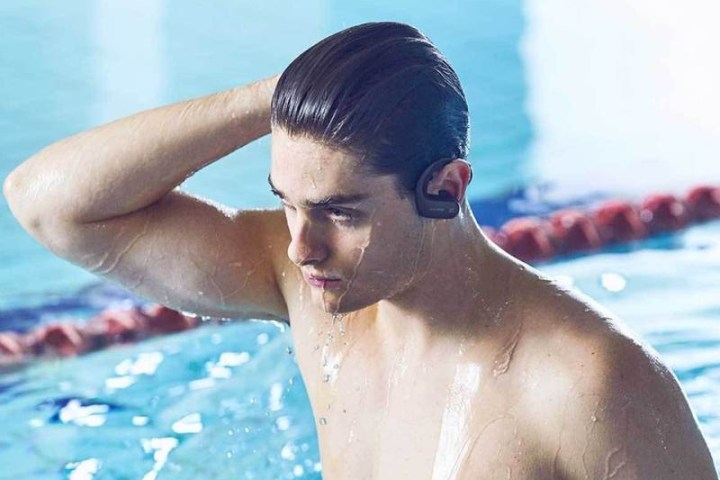
Sony NW-WS623 Walkman
The best overall headphones for swimming
- Built-in MPS capabilities so you don’t have to rely on Bluetooth
- Up to 16GB of memory
- 12-hour battery life
- Can be used as traditional wireless headphones, too
- Need to take the time to choose and load your playlists beforehand
Why you should buy them: For the price and the number of features you get compared to other entries on our list, the Sony NW-WS623 Walkman represent everything a swimmer needs.
Who they’re for: Casual to advanced swimmers who don’t want to mess with headphones and separate MP3 players — or phones — in the pool and may want the option to use them out of the water as well.
Why we picked the Sony NW-WS623 Walkman:
Getting a workout in on the best of days can be a challenge, so the less preparing and tinkering you have to do to get in the water, the better. With minimal setup, you’ll be ready to get wet in no time with Sony’s NW-WS623s, which combine the MP3 player — Sony’s Walkman brand, no less — and in-ear headphones in one compact, complete unit. Music, podcasts, and audiobooks are easily side-loaded from your computer via an included USB cable, and the WS623s are available in 4GB and 16GB variations, which means plenty of audio content for even the longest swim session … and you don’t have to worry about dropping a Bluetooth connection.
Like any pair of waterproof headphones you choose, the seal the earbud makes is paramount, as it helps ensure the buds stay firmly in your ears while swimming and has a big effect on how good the music sounds by blocking outside noise. The Sony WS623s get checkmarks in both of these areas. The included eartips create a firm seal, and around-the-ear hooks and the comfortable neck strap help further stabilize the headphones while in the water. The sound is surprisingly clean — with ample low-end and defined mids and highs — which is difficult to achieve underwater, and the controls are easily accessible on the outside of each earpiece.
Speaking of water, the WS623s have it where it counts here, too. Their IPX5/8 waterproof rating certifies them for use in fresh or saltwater to a depth of up to 2 meters (6.5 feet), and their IP6X rating makes them dustproof, too, in case you want to transition to a run on the beach. Battery life is impressive, with the WS623s getting up to 12 hours on a single charge, topping all others on our list. And for those times when you forget to charge up, just plug them in for a three-minute quick charge for an hour of playback.
We chose the Sony NW-WS623 as the best overall headphones for swimmers because they’re great in the water, but they’re also stellar on land or in the gym. Bluetooth connectivity brings your phone into the mix, opening the door to streaming playlists and taking calls, while an ambient sound mode lets outside sound in, allowing you to easily hear the encouraging yells of your spin class instructor.
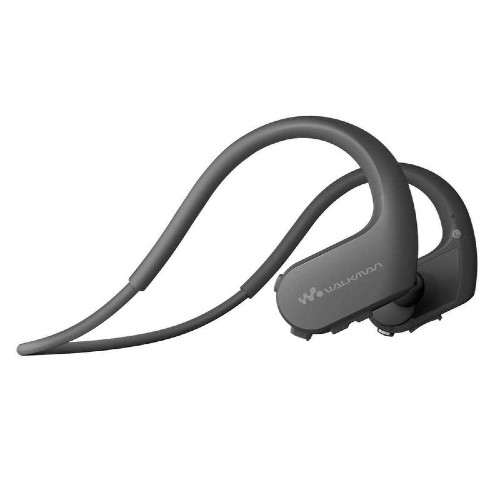

Underwater Audio Swimbuds Sports
The best wired earbuds for swimming
- Dual-chamber audio for better sound
- 11 total eartips to choose from for underwater fit
- Low-drag design
- Requires a waterproof MP3 player
Why you should buy them: One of the best-sounding underwater earbuds we’ve found, the Swimbuds Sport are the best in the business for durability and fit, offering a staggering 11 eartip choices.
Who they’re for: Serious swimmers looking for secure earbuds that can withstand flips and strokes and who want the choice of adding the MP3 player that’s right for them.
Why we picked the Swimbuds Sport:
Underwater Audio has developed a reputation for making highly-rated, great-sounding, and durable earbuds for swimmers — and the Swimbuds Sport helped put the company on the map. When looking for a pair of underwater headphones, it’s often a toss-up between fit and sound quality, but with the Swimbuds Sports, you don’t have to sacrifice one for the other. Each earbud housing includes a dual-chamber design that helps focus sound while also providing additional waterproofing. The result is a pair of earbuds with an underwater sound that’s balanced, clear, and robust … and beats any on our list.
When it comes to fit, this is the pair of headphones you want if you’re a more advanced swimmer practicing a variety of strokes and wall flips. The Swimbuds Sport are made for this, offering four different styles of eartips (three specifically for swimming) and 11 tips in total. In short, if you’ve had a hard time finding a good, comfortable seal in the past, chances are you’ll find your match with the Swimbuds Sport. You’ll even have several options if you want to use them out of the pool as well.
Of course, it’s key to mention that you’ll have to pick up a waterproof MP3 player to use with the Swimbud Sports, but there’s a wide range of those; Underwater Audio has some good options if you want to keep it in the family. The short and unobtrusive headphone cord is easily tucked under a bathing cap, connecting to an MP3 player, which is typically secured to the goggle strap mounted on the back of your head. The Swimbuds Sport are IPX8-certified, submersible in up to 10 feet of water, and come with an extension cord for use outside the pool.

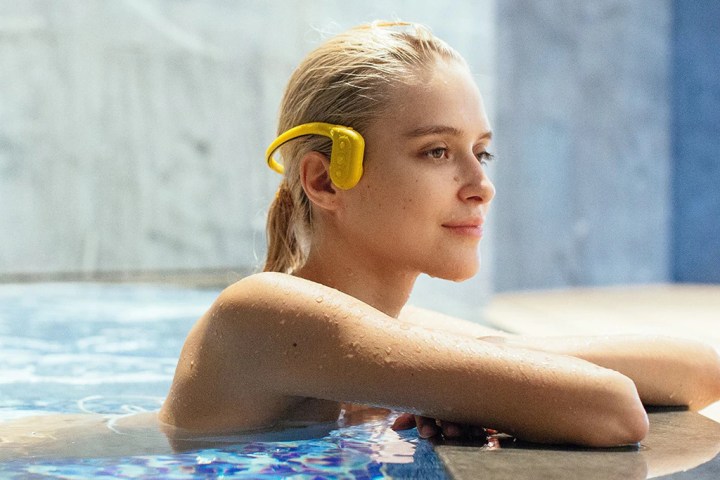
Tayogo Waterproof Bone Conduction Headphones
The best bone-conduction headphones for swimming
- Keeps your ears clear
- Integrated MP3
- Strong format support
- FM tuner
- Limited five-hour battery life
Why you should buy them: Bone-conduction headphones offer an alternative to in-ear headphones. Tayogo’s are a comfortable, great-sounding, all-in-one unit with tons of features.
Who they’re for: Swimmers who want to listen to music but don’t like wearing earplugs or in-ear headphones. Relatively inexpensive, they’re also great on land, allowing you to hear the world around you.
Why we picked the Tayogo Waterproof Bone Conduction Headphones:
Bone-conduction headphones aren’t new — some impressive models enter the market each year — but they’re often overlooked. One of the basic benefits of bone conduction is that your ears can stay unobstructed so you can still experience what’s going on around you. How? Through conduction pads situated on your cheekbones, which send sound to your inner ear as vibrations through the bones in your face instead of through your ear canal. The result is surprisingly crisp, bass-rich, and clear sound, especially underwater. If you’re someone who finds wearing earbuds or earplugs while swimming uncomfortable or even painful, then bone conduction is something you should consider — they’re also beneficial for people with hearing issues.
As an integrated MP3 player-headphone option for swimmers, the Tayogo Waterproof Bone Conduction Headphones have more features than most models on our list. Waterproof in up to 3 meters, you’ll have no issues in the pool, although you may want to steer clear of choppy ocean waters as the fit may not be as firm as earbuds such as the Swimbud Sports. You won’t need a separate MP3 player, as the Tayogo is an MP3 player with 8GB of storage and support for MP3, WMA, APE, FLAC, and WAV codecs. They also sport five hours of battery life, which isn’t great, but if your swim lasts that long, you’ve likely got other problems.
Additionally, the Tayogo Waterproof Bone Conduction Headphones are the only pair of headphones on our list that are built to withstand temperatures of 140-degree Fahrenheit, meaning you can keep the tunes going while in the steam room after your swim. Out of the pool, the Tayogos will serve you well, too, with Bluetooth pairing and an FM radio.

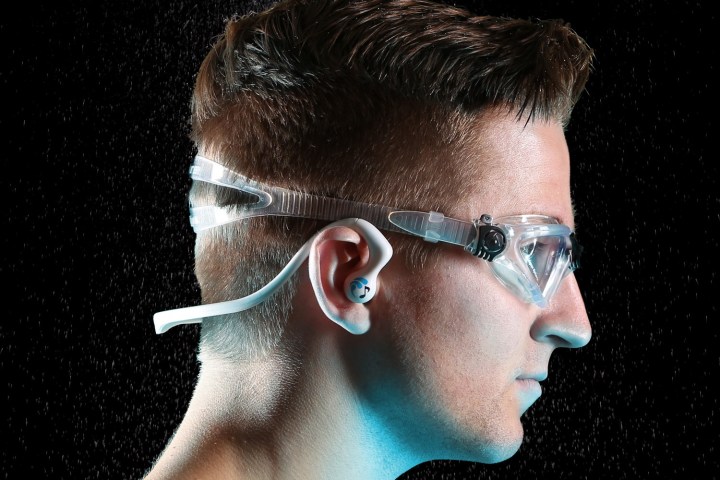
Underwater Audio Hydroactive Premium
The best neckband headphones for swimming
- Banded design wraps around ears to withstand any swimming movement
- 11 eartip options
- Multiple protection chambers
- Headphone cord is short and requires MP3 player
Why you should buy them: With industry-leading fit and sound quality, the Swimbud Hydroactives are not only high-performing earbuds for swimmers, they’re also built to withstand whatever water sport you can throw at them.
Who they’re for: Hardcore swimmers, surfers, kayakers, paddleboarders, and anyone who is looking for a pair of headphones that will stay put during the most intense of water activities.
Why we picked the Swimbuds Hydroactive Premium:
Similar to their cousins, the Swimbuds Sport, we chose the Hydroactives partly because of their great underwater sound, sleek and compact design, and 11 eartip options, which ensure a water-tight fit for everyone. They come with four different styles, and the company even outlines suggestions for which tips are best for swimming and water sports.
But where the extra $30 shows its worth is in the banded design, which keeps a low profile as it wraps around the contours of your ears, then hugs the back of your neck. The angle of the eartips in the ear canals create a comfortable and tight seal, while the added support of the neckband secures the headset for a fit unlike any other earbuds on our list. Add the additional stabilization of a swimming cap and goggles, and the Hydroactives will withstand dive starts, backstrokes, flip turns, waves, kayak flips, and more.
As with all of Underwater Audio’s waterproof headphones, the Swimbuds Hydroactive have an IPX8 rating and can be submerged in water up to 10 feet for however long you want. A short, 3.5mm headphone cord plugs into whatever MP3 player you choose and will stay out of your way in the water.
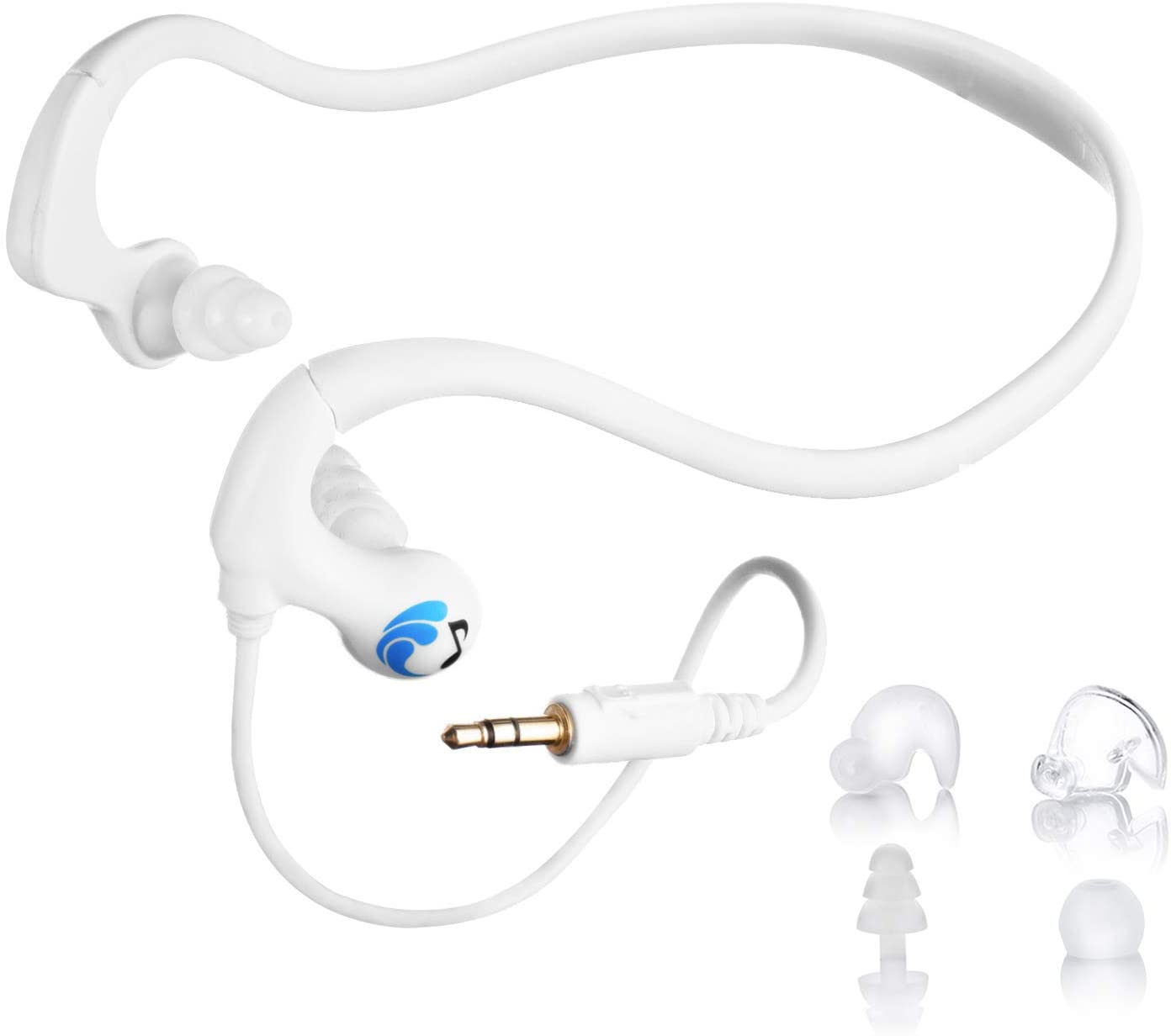

Shokz OpenSwim
The best high-end bone-conduction option
- Excellent bone-condution design
- Kit includes nose clip and earplugs
- Spacious onboard storage for playlists
- Battery life is a bit short
Why you should buy them: They have excellent bone-conduction features for those who want to pay a bit more.
Who they’re for: Swimmers who want to keep their ears open and are willing to pay a bit more for an excellent kit.
Why we picked the Shokz OpenSwim:
We covered many of the benefits of bone-conduction headphones when talking about the Tayogo pick, but there’s another bone-conduction option if you’re willing to spend a bit more to get a better suite of features. That includes not only the headphones themselves but a companion nose clip and matching earplugs.
Shokz has years of experience with bone conduction that pay off with this wraparound titanium frame. It also made room for internal music storage that can hold up to 1,200 songs, easily enough to contain all your favorite swimming playlists and more. The IP68 waterproofing means submerging the headphones is no problem, either. And the headphones were designed to fit up swim caps and helmets, weighing just less than an ounce.
We do wish battery life could be better — eight hours is fine for a good workout session or two but you’ll need to recharge frequently — but overall, if you already know you like bone conduction and want to upgrade to one of the best options, the OpenSwim is a good pick.

Frequently Asked Questions
Depending on what’s more important to you (sound, fit, ease of use), a pair of standalone earbuds will broaden the choices available to you, allowing you to cater to your specific preferences. But you’ll also need to get a separate waterproof MP3 player, which means more money, though it also means you get to keep your headphones if your player breaks. Thankfully, there are several great hybrid units on the market. You can store music on them, and you don’t have to connect them to a separate device, making them a great grab-and-go option. You also won’t need to fuss with strapping them to your goggles, since most just wrap around your neck and you’re good to go.
Typically, most swimming headphones exist as a standalone unit or are wired (to a waterproof MP3 player). Because they’re wired, they’ll deliver the best sound possible. When we think of wireless, however, that usually means Bluetooth, but in the context of swimming headphones, Bluetooth doesn’t have a big stake yet because headphones with reliable Bluetooth signals underwater are currently hard to come by.
Around-the-neck headphones tend to stay on better, with additional support coming from the back of the head or neck. They also help prevent loss if your buds happen to slip off while swimming in open water.
A good seal can make all the difference. One, it helps protect your ears like earplugs do, keeping them safe from water getting in, which can cause infection. Second, the better the fit and seal, the better it will block outside noise, allowing for improved sound.
Water-resistant doesn’t mean waterproof. Water-resistant devices usually garner a rating of IPX3 to IPX4, meaning that they’ll probably be OK if you splash water on them or if they accidentally fall in the toilet. For swimming, you’re going to want a pair of buds with at least an IPX8 rating, especially if you’re swimming laps. While each manufacturer defines the depth and duration their products can go under this rating, IPX8 typically means the ability to be submerged in more than 1 meter of water for prolonged periods. Although they vary, most swimming headphones hover somewhere around the 2-meter to 4-meter range.
No. You can definitely find online guides to waterproof your headphones, but it won’t work. Headphones that don’t have the proper resistance rating will be ruined by water damage when submerged, no matter what you try to do to them.
It’s a bad idea for a couple of reasons. First, most headphone ratings are only for submersion up to a certain number of meters/feet. Go beyond that, and you could risk damage. Second, your hearing is important when diving. You want to stay alert for nearby noises, communication with other divers, etc.
It probably won’t hurt your headphones, but we suggest taking them off first. Soaps and shampoos aren’t the best things to coat your headphones in, even if they are waterproof.
Editors’ Recommendations
Fumali – Services Marketplace – Listings, Bookings & Reviews
